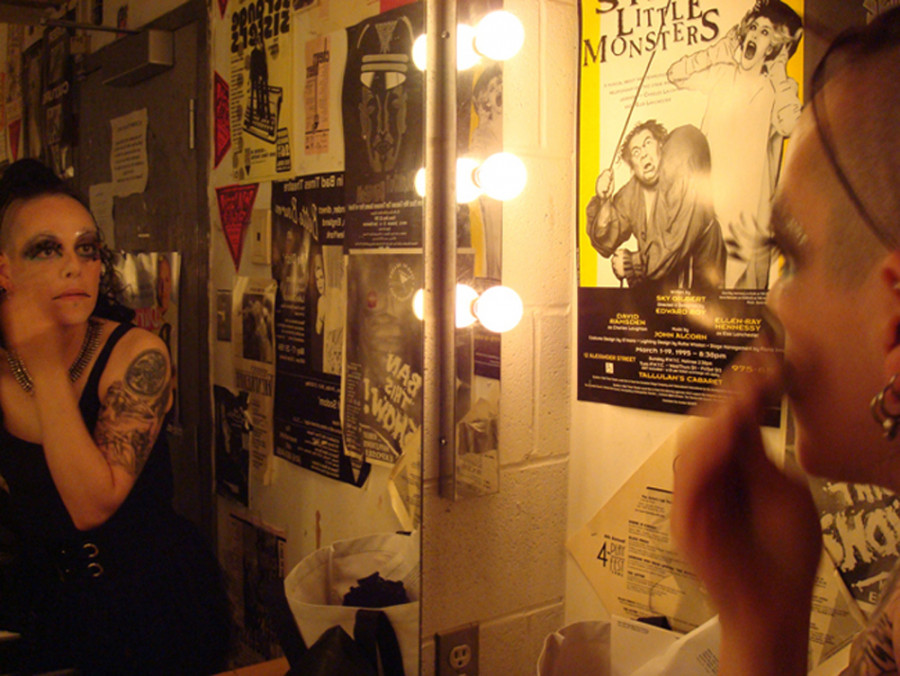Don’t Wanna Be Sedated
For those of us who have spent most of our lives in Montreal, it’s pretty hard to imagine life in a town without record stores or movie theatres.
Queer punk writer Kristyn Dunnion called such a place home during her childhood, but it wasn’t long before she was planning an escape.
The McGill Literature graduate now calls Toronto home, where you can catch her performing at the odd burlesque as Miss Kitty Galore, or rocking the bass in her all-girl metal band when she isn’t writing about mosh pits or sexy science fiction.
Her latest book The Dirt Chronicles is a first-person punk narrative inspired by events experienced and observed, including time spent living with a Toronto collective.
The novel tells of kids seeking community in an abandoned factory in Toronto, in a series of inter-connected short stories. It’s a Canadian punk Trainspotting of sorts, laying every detail bare and brutal.
“[In] the first story, the main character is a middle-aged rocker, recently divorced and having a bit of a midlife crisis,” Dunnion said. “He meets this migrant worker from Mexico and they develop this unlikely friendship. That kid wants to be in a punk band.”
The refuge-seeking characters come from the kind of people Dunnion met when she made the move to the big city.
“So many people I know in Toronto and Montreal aren’t necessarily from there—they fled there. We often tried to forget what was left behind, it’s not cool or it’s painful or mildly embarrassing in some way,” said Dunnion. “The kids in the story are leaving pretty painful situations.”
Throughout the last year and a half, Dunnion has been working on a grant project, giving storytelling workshops in rural high schools. It reminded her of her own experience being raised in an environment “where you’re not allowed to listen to guitar music.”
Working with those kids reminded Dunnion of what she had decided to leave behind, sentiments that find home in The Dirt Chronicles.
“For me it was pretty isolating growing up in a small town, and kids like that are the ones I’m writing for, even though kids have access to a lot of online support that wasn’t there for me,” said Dunnion. “But I still think it’s pretty isolating. The rate of teen suicide for queer youth and aboriginal youth is really high, way higher than the national average. Kids are still feeling isolated for sure.”
Dunnion hopes her work can help kids out of that isolation, partly by giving a perspective that a teacher or parent may not identify with.
For a subculture over 30 years old that has withstood the throngs of commercializing forces, punk is doing just fine. Visually, it has penetrated the mainstream, but the heart of the movement remains rightly out of the spotlight.
“It seems like real punks, crust punk and nomad punk community, are off the grid, alive and well. Kids are hopping the rails, hitchhiking up and down, certain cities are sort of hotbeds for it,” said Dunnion. “It’s nice to see waves of kids and the old crotchety punks still coming out to stuff.”
As a kid, Dunnion would listen to CBC’s Brave New Waves late at night in her Essex County, Ontario home, idealizing the radical sounds and ideas she heard because of the cultural stagnancy of her hometown.
Coming from a town with one traffic light, without access to different kinds of ideas, she was starving for anything different. It meant some hard times, but ultimately Dunnion was able to survive them and align with like-minded punks.
“Sometimes you’re in a space where you’re a girl, or a queer girl or something like that, you’re just an ant, you’re nothing. Sometimes people are assholes and just care about getting wasted,” said Dunnion. “I’ve never been straight edge, but at certain times in my life it was hard to separate punk ideals to me, which are really more like queer politics, to blend those with a punk lifestyle which is not always about ideas or a better way to live.
“It’s often about survival, anger, acting out and not giving a shit. That’s still hard to reconcile at times, when people are being fucking goofs, you know?”
Even so, Dunnion finds home in the subculture, and has for some 20 years.
“You could go and get your head kicked in or get wasted at some punk show, or you could spend hours arguing with someone about whether you were able to use a fax machine because technology’s bad. I’m not exaggerating, that was a biggie,” she laughed.
_ (Not-So) Local Legends Reading Series / Co-op Bookstore (2150 Bishop St.) / Oct. 5 @ 7 p.m./_ Facebook Event


_600_832_s.png)
